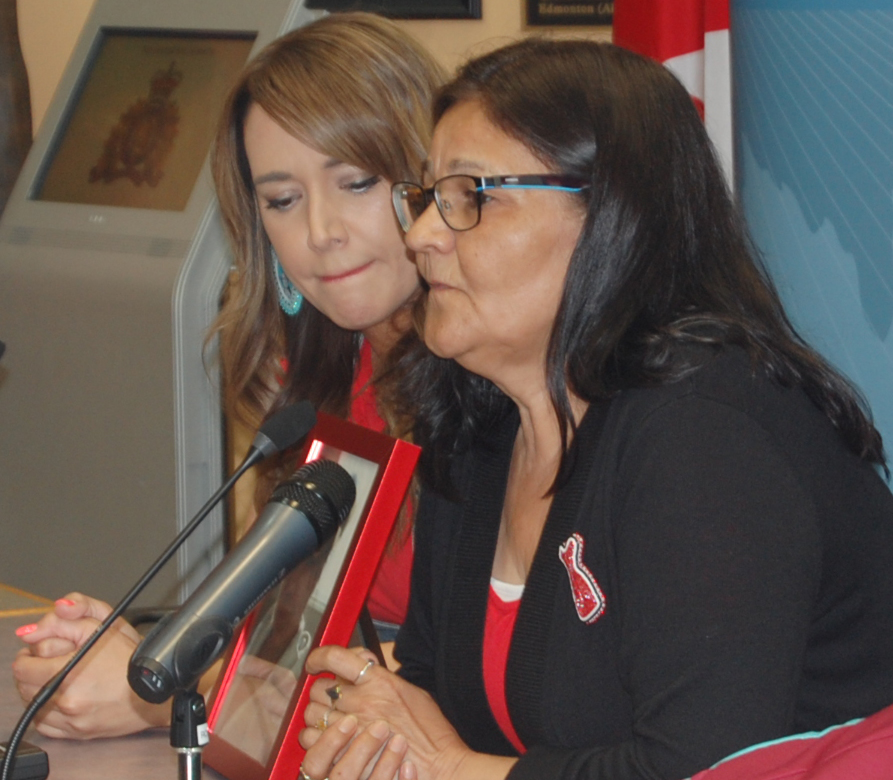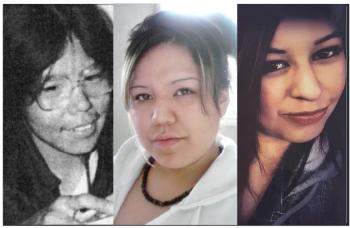Image Caption
Summary
Windspeaker.com Contributor
For every Vivian Tuccaro and Marlene Jack who push the police to continue to investigate the cases of their missing and murdered loved ones, there are hundreds of women without the capacity, skill or resources to do the same.
“We, as families, we need to come together and … work our resources together,” said Paul Tuccaro, brother to missing and murdered sister Amber. “We’re willing to go with (other families) to the RCMP … because we know what the process is… Now we know. And now that’s what we want to do to help everybody.”
In Edmonton on July 25, Vivian and son Paul listened to a public apology from Alberta RCMP for how the investigation into Amber’s disappearance in 2010 was mishandled by the Leduc RCMP. Two years later her body was found in a field in Leduc County. The case remains open.
Following the apology, Amber’s mom Vivian urged other mothers to fight if their daughters’ cases have been mishandled.
“If you’ve been wronged, like Amber’s case was, come forward. Call me and Paul. We will give you the right resources. We were lucky finding the right resources,” she said.
Vivian specifically recognized April Eve Wiberg of the Stolen Sisters and Brothers Awareness Movement in Alberta, who sat with her during the public apology. The movement organizes rallies, walks and vigils to help honour loved ones and to raise awareness.

Wiberg stressed that not only was Amber’s case unsolved, but so were the cases of the four other women whose remains were found in the same area as Amber’s.
The Tuccaros also received help from the Institute for the Advancement of Aboriginal Women and its founder Muriel Stanley Venne.
Rachelle Venne, CEO with IAAW, said files like the Tuccaros’ “just kind of sit on the sides of our desk where we support (them) and try to do what we can. We don’t get funding for it.”
Venne said there is a “big disconnect” when it comes to families even understanding that support, whether financial or maps for search areas, is available. To help make connections, IAAW hosts family gatherings. This September, families will be meeting with the Edmonton Police Service and Metis and Family Child Services to learn about the kind of support that is available to them and to connect with other families.
IAAW offers in-kind support and does fundraisers for families as well, said Venne.
For the Tuccaro family, who live in Fort Chipewyan, it is an 11-and-a-half-hour drive or an expensive plane trip to Edmonton to continue to fight for Amber.
Victims Services funds, administered provincially, provide some financial compensation to families of murder victims, but it’s a “very piddly amount of money,” said Venne, who admits it would barely do anything to cover the expenses incurred by the Tuccaro family.
A fundraiser is being planned right now for the Tucarro family. Venne said IAAW will help anyway it can.
On July 24, Cheslatta Carrier Nation Chief Corinna Leween stood before the Assembly of First Nations in Fredericton as they discussed the final report from the National Inquiry into Murdered and Missing Indigenous Women and Girls.
She told chiefs and their proxies that the RCMP was conducting a probe in a “remote area in our area with a very good lead” for evidence relating to the 30-year-old disappearance of the four-member Jack family.
“I would just like to really acknowledge the family and their determination never (to) give up,” said Leween.
Marlene Jack had appeared in front of the MMIWG inquiry and shared the story of her missing older sister Doreen Jack. In August 1989, Doreen, her husband Ronald, both 26, and their sons Russell, 9, and Ryan, 4, were last heard from in Prince George. They had both accepted positions at a work camp with their children to go into daycare there.
Chief Leween acknowledged the support the Jack family had received from the AFN and specifically the B.C. regional chief.
“Terry Teegee spent many hours with the Jack family listening to their stories and their plight,” she said.
Leween also spoke about the restrictions families faced in searching for those who have gone missing. The Jacks’ family lived in Prince George, three hours away from Burns Lake.
“Some of our families can’t go looking for their loved ones because they can’t afford to,” she said
“There’s very little supports or resources for families who have a missing loved one and even through the trial proceedings where their loved one has been murdered there’s very little resources attached to supporting families who have been impacted,” said Hilda Anderson-Pyrz, manager, of the MMIWG liaison unit, with Manitoba Keewatinowi Okimakanak (MKO).
On July 2, Anderson-Pyrz accompanied George and Melinda Wood of Bunibonibee Cree Nation (Oxford House), as George spoke to the loss of their daughter Christine Wood, 21. That day Brett Overby, 32, was sentenced to life in prison with no chance of parole for 15 years. He admitted to killing Christine in the basement of his Winnipeg home. Christine went missing in August 2016. Her body was discovered 10 months later where he had buried her near a farmer’s field east of Dugald, Man.

“When families have missing/murdered, they need to have those financial supports. When we look at the Wood family, they’re from a remote, isolated community. In many circumstances, the women and girls who have been murdered or who have gone missing have families who live in remote, isolated locations. It’s a very difficult journey for them financially to be able to come to a major urban centre and do a search and not have the financial resources to do it. When your family is missing you want to do what you can to assist in that search because that’s our loved one,” said Anderson-Pyrz.
There is no driving route between Oxford House and Winnipeg.
Not only did the Wood family have to worry about the cost of travel, accommodations and food while searching for Christine, they also had to cover the majority of their costs while Overby was in court.
Melinda Wood also lost her job.
“As a parent you don’t really care about your employment. If your child is out there missing, you want to do what you can to find your child,” said Anderson-Pyrz.
MKO did what they could to financially support the Woods, she added, including setting up a GoFundMe page.
There is nothing specific in the MMIWG final report about providing financial supports to help families with the costs associated with searches and attending court although that was a concern continuously raised at hearings, said Venne.
The recognition for that need, said Anderson-Pyrz, “is contained in there as supports for family throughout different Calls for Justice.”
The final report, entitled “Reclaiming Power and Place,” has 231 Calls for Justice directed at federal, provincial and indigenous governments, institutions, social service providers, industries and Canadians-at-large.
The report covers murdered and missing First Nations, Inuit and Métis women and girls as well as two-spirited, lesbian, gay, bisexual, transgender, queer, questioning, intersex and asexual people. The report was delivered in two volumes with two supplementary volumes on June 3.

